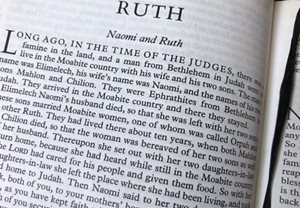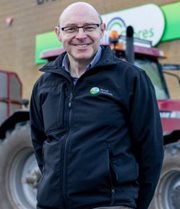“How can we make ends meet?”
Wherever I go, this is a regular topic of conversation, especially as input costs like fuel, feed and electricity continue to rise, and fertiliser prices remain sky-high. Pig producers have been hardest hit, but all sectors of agriculture are feeling the current squeeze.
 “How can we make ends meet?” is a question that resonated painfully with a woman called Ruth and her family. We all love skilfully told stories and I would encourage you to read for yourself this Bible page-turner that is named after her: the Book of Ruth.
“How can we make ends meet?” is a question that resonated painfully with a woman called Ruth and her family. We all love skilfully told stories and I would encourage you to read for yourself this Bible page-turner that is named after her: the Book of Ruth.
Ruth is part of a family of three widows; her husband, brother-in-law and father-in-law have all died. Her sister-in-law decides to return to her own people, leaving just Ruth and her mother-in-law, Naomi.
Naomi’s homeland is Israel, Bethlehem to be exact, which means ‘house of bread’, but a famine there led to the family leaving God’s ‘Promised Land’ of Judah that He had given His people to live in and head for Moab (Ruth 1:1).
God’s blessing
On hearing how God is blessing His people back in the Promised Land, Naomi decides to return home and tells her daughters-in-law to remain in Moab, their own country, where they have family and may even find love again (1:6-13). Naomi notes that her other daughter-in-law, Orpah, has “gone back to her people and to her gods” (1:15).
But although Naomi gives Ruth the same opportunity to stay in Moab, Ruth replies in words that not only show deep affection for her, but are also a clear profession of her faith in the one true God, “Do not urge me to leave you or to turn back from you. Where you go I will go, and where you stay I will stay. Your people will be my people, and your God my God” (1:16).
Ruth lived in days where God’s Son Jesus was merely predicted and promised. Today we live in a time when we can read all about how Jesus has already lived for us, died for our forgiveness and risen again to beat death for us. We have a far clearer understanding of God and His salvation than Ruth did. Yet she still clearly committed her life to the true and living God. Have you?
A kinsman-redeemer
Now back in Bethlehem, the nearest male relative was called ‘a kinsman-redeemer’ and was required not only to buy the property of the dead man, but marry his widow and have a family on his dead relative’s behalf. The kinsman-redeemer would then have to hand the property back to the dead man’s child when they grew up. So to be a ‘kinsman-redeemer’ required selfless love. When Ruth’s nearest male relative refuses, a man called Boaz steps in selflessly and marries her. (See chapter 4).
The hint to us is plain. Jesus later came as our Redeemer, shedding His own blood as the price to pay the eternal debt of our sins and bring us back to God. Have you responded to Jesus’ selfless love for you?
Ruth’s family tree is traced forwards to King David (4:18-22). Matthew traces Ruth’s family line further – to Jesus Himself (Matthew 1:1-17). So, by faith in the living God, Ruth became a member of Jesus’ family! If you put your faith in Jesus, so can you- and discover so much more than making ends meet.
 Rev Kenny Hanna is the Presbyterian Church in Ireland’s first Rural Chaplain. Growing up on the family farm in the Kingdom of Mourne, he began serving in parish ministry in 2001 in Glenwherry. Prior to his appointment as Rural Chaplain, he was minister of Second Dromara Presbyterian Church for 10 years. He continues to farm part-time.
Rev Kenny Hanna is the Presbyterian Church in Ireland’s first Rural Chaplain. Growing up on the family farm in the Kingdom of Mourne, he began serving in parish ministry in 2001 in Glenwherry. Prior to his appointment as Rural Chaplain, he was minister of Second Dromara Presbyterian Church for 10 years. He continues to farm part-time.
His blog appeared in today’s Farming Life, a fortnightly column entitled ‘Good News for the Countryside’, where people from a farming background, or who have a heart for the countryside, offer a personal reflection on faith and rural life.
You can look at other blogs in this series here. If you would like to talk to Kenny about any of the issues raised in this article, please email Kenny at ruralchaplain@presbyterianireland.org or call him on 07938 488 372.